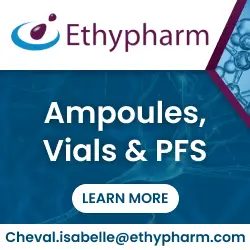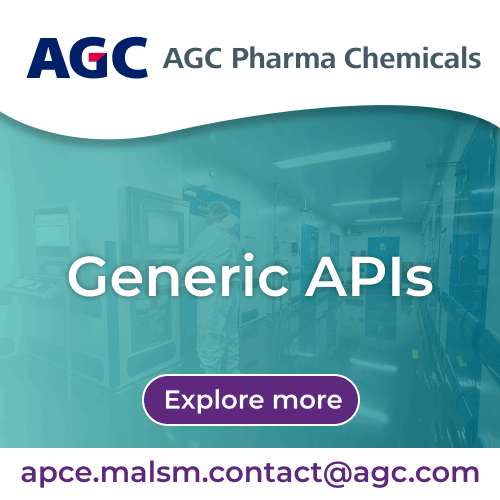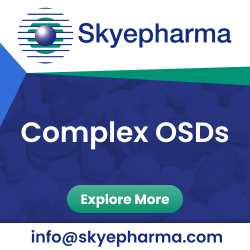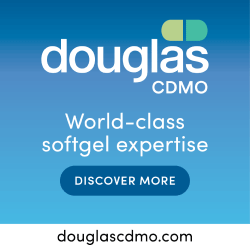BLOG
MARKET INTEL by PharmaCompass
CONTENT by Suppliers
- Interview #SpeakPharma
- Video #SupplierSpotlight
- Vlog #PharmaReel
- Company Bio #AboutSupplier
- Service Bio #AboutCapabilities
News
Create content with us, ask us


- AEROSOL
- BIOLOGIC DRUGS
- CAPSULE
- CREAM / LOTION / OINTMENT
- ELIXIR
- EMULSION
- FILM
- GEL
- GRANULE / PELLET
- DIETARY SUPPLEMENT (NUTRACEUTICAL)
- INJECTABLE / PARENTERAL
- LIPOSOME / MICROSPHERE / NANOPARTICLE
- LIQUID
- MEDICAL DEVICE
- PASTE
- PATCH
- PESSARY
- POWDER
- SOFTGEL CAPSULE
- SOLUTION
- SPRAY
- SUPPOSITORY
- SUSPENSION
- SYRUP
- TABLET
- VETERINARY
- NASAL
- TROCHE & LOZENGE
- LYOPHILIZATION
- DENTAL
- RAW MATERIALS
- TECHNOLOGIES
- EQUIPMENT
- COMPOUNDING

01 Clinical Supply
02 Effervescent
03 Enteric Coated
04 Enteric Coated
05 Modified Release
06 Modified Release
07 Modified Release
08 Overview
09 Overview
10 Overview
11 Overview
12 Overview
13 Overview

01 Aesica Pharmaceuticals Limited
02 AlbyPharma
03 Appco Pharmaceutical Corp
04 Ardena
05 Athena Pharmaceutiques
06 Chanelle Medical
07 Doppel Pharma
08 Ethypharm
09 Gensenta Pharmaceuticals
10 Glatt Pharmaceutical Services
11 Globela Pharma
12 Grunenthal
13 Halo Pharmaceutical
14 Innopharmax
15 JGL d.d
16 Labiana Life Sciences S.A
17 Labiana Pharmaceuticals
18 Lecifarma
19 Madras Pharmaceuticals
20 Mars Therapeutics
21 NanoAlvand
22 ORIT LABS LLC
23 Osmopharm
24 Pfizer CentreOne
25 Priyans Drugs
26 Quay Pharmaceuticals Ltd.
27 Ravoos Laboratories
28 Recipharm AB
29 Ropack Inc
30 S.C. Rompharm Company SRL
31 Saneca Pharmaceuticals
32 Siegfried AG
33 Skyepharma
34 Sofarimex
35 Specpharm
36 Tianjin Hankang Pharmaceutical Biotechnology
37 Blank

01 Belgium
02 China
03 Croatia
04 France
05 France
06 France
07 Germany
08 India
09 Iran
10 Ireland
11 Italy
12 Portugal
13 Romania
14 Singapore
15 Slovakia
16 South Africa
17 Spain
18 Sweden
19 Switzerland
20 Taiwan
21 Turkey
22 U.S.A
23 U.S.A
24 U.S.A
25 United Kingdom
26 Blank
- Analytical > Analytical Method Development
- Analytical > Analytical Testing Services > Inhalation Products
- Analytical > BioAnalytical Services
- API & Drug Product Development > API Development
- API & Drug Product Development > API Development > Antibody Drug Conjugate
- API & Drug Product Development > API Development > Fine Chemical / Intermediate
- API & Drug Product Development > API Development > High Potency APIs (HPAPIs)
- API & Drug Product Development > API Development > Impurity / Reference Standard
- API & Drug Product Development > API Development > Oligonucleotide / Polynucleotide
- API & Drug Product Development > API Development > Oligosaccharides & Polysaccharides
- API & Drug Product Development > API Development > Overview
- API & Drug Product Development > API Development > Process Development & Optimization
- API & Drug Product Development > API Development > Protein / Peptide
- API & Drug Product Development > API Development > Separation & Purification
- API & Drug Product Development > API Development > Small Molecules
- API & Drug Product Development > API Development > Spray Drying
- API & Drug Product Development > Formulation Development
- API & Drug Product Development > Formulation Development > Buccal / Orodispersible
- API & Drug Product Development > Formulation Development > Capsule
- API & Drug Product Development > Formulation Development > Chewable / Suckable
- API & Drug Product Development > Formulation Development > Clinical Supply
- API & Drug Product Development > Formulation Development > Compounding
- API & Drug Product Development > Formulation Development > Controlled / Immediate / Modified Release
- API & Drug Product Development > Formulation Development > Controlled Substance
- API & Drug Product Development > Formulation Development > Granule / Pellets
- API & Drug Product Development > Formulation Development > Inhalation / Nasal
- API & Drug Product Development > Formulation Development > Injectable / Parenteral
- API & Drug Product Development > Formulation Development > Liquid Formulation
- API & Drug Product Development > Formulation Development > Lyophilization
- API & Drug Product Development > Formulation Development > Ophthalmic
- API & Drug Product Development > Formulation Development > Pediatric Formulation
- API & Drug Product Development > Formulation Development > Scale-Up Capabilities
- API & Drug Product Development > Formulation Development > Sterile Liquid Formulation
- API & Drug Product Development > Formulation Development > Suspension
- API & Drug Product Development > Formulation Development > Tablet
- API & Drug Product Development > Formulation Development > Topical
- API & Drug Product Development > Preformulation & Material Science > Particle Size Reduction & Micronization
- API & Drug Product Development > Preformulation & Material Science > Polymorph & Crystal Screening
- API & Drug Product Development > Preformulation & Material Science > Solubility Assessment & Enhancement
- API & Drug Product Development > Preformulation & Material Science > Taste Masking
- API Manufacturing > Antibiotic
- API Manufacturing > Antibody Drug Conjugate
- API Manufacturing > Biologics, Bioprocess & Fermentation
- API Manufacturing > Chiral Synthesis
- API Manufacturing > Clinical Supply
- API Manufacturing > Continuous Flow Process
- API Manufacturing > Contract Manufacturing
- API Manufacturing > Controlled Substance
- API Manufacturing > Custom Synthesis & Manufacturing
- API Manufacturing > Cytotoxic Compound
- API Manufacturing > Drying > Spray Drying
- API Manufacturing > Fine Chemical / Intermediate
- API Manufacturing > GMP Manufacturing
- API Manufacturing > Hazardous Chemistry
- API Manufacturing > High Potency APIs (HPAPIs)
- API Manufacturing > Micronization
- API Manufacturing > Oligonucleotide / Polynucleotide
- API Manufacturing > Oligosaccharides & Polysaccharides
- API Manufacturing > Organometallic Chemistry
- API Manufacturing > Organometallic Chemistry > Cyanation
- API Manufacturing > Organometallic Chemistry > Metal Hydride Reduction
- API Manufacturing > Ozonolysis
- API Manufacturing > Process Development & Optimization
- API Manufacturing > Protein / Peptide > Synthesis
- API Manufacturing > Reference Standard
- API Manufacturing > Scale Up
- API Manufacturing > Separation & Purification
- API Manufacturing > Small Molecules
- Clinical Trials > Compliance, Regulatory & Consulting
- Clinical Trials > Packaging & Logistics
- Clinical Trials > Medical Writing & Language Translation
- Clinical Trials > Patient / Investigator Recruitment
- Clinical Trials > Technology / Data / Analytics
- Drug Product Manufacturing > Biologic Drugs
- Drug Product Manufacturing > Capsule
- Drug Product Manufacturing > Capsule > Steroid / Hormone
- Drug Product Manufacturing > Compounding
- Drug Product Manufacturing > Cream / Lotion / Ointment
- Drug Product Manufacturing > Emulsion > Overview
- Drug Product Manufacturing > Gel > Overview
- Drug Product Manufacturing > Granule / Pellet
- Drug Product Manufacturing > Injectable / Parenteral
- Drug Product Manufacturing > Injectable / Parenteral > Overview
- Drug Product Manufacturing > Injectable / Parenteral > Pre-Filled Syringe
- Drug Product Manufacturing > Liquid
- Drug Product Manufacturing > Lyophilization
- Drug Product Manufacturing > Nasal
- Drug Product Manufacturing > Softgel Capsule
- Drug Product Manufacturing > Solution > Overview
- Drug Product Manufacturing > Spray
- Drug Product Manufacturing > Suppository
- Drug Product Manufacturing > Suspension > Overview
- Drug Product Manufacturing > Syrup
- Drug Product Manufacturing > Tablet
- Drug Product Manufacturing > Technologies
- Drug Product Manufacturing > Technologies > Orally Disintegrating Tablets (ODTs)
- Drug Product Manufacturing > Technologies > Taste Masking
- Packaging > Clinical Services
- Packaging > Contract Services
- Packaging > Contract Services > Serialization Compliance
- Packaging > Logistic Services
- Empty Capsules
- Empty Capsules > Clinical Supply
- Empty Capsules > HardGel
- Empty Capsules > Inhalation
- Emulsifying Agents
- Soft Gelatin
- Solubilizers
Overview of contract drug product manufacturing services that enable the production of coated pellets & granules with varied release profiles.
Q1. What are granules & pellets?
Granules
Granules are aggregations of fine particles of powder, drugs and excipients, bound together by binding agents into larger, free-flowing irregularly shaped spherical masses, which typically fall within 850 µm to 4.75 mm in size. Granules flow better than powders, increase compressibility, and have smaller surface areas than comparable volumes of unaggregated powders.
Furthermore, granules are produced to enhance the uniformity of the API in the final product, to increase the density of the blend so that it occupies less volume per unit weight for better storage and shipment, to facilitate metering or volumetric dispensing, to reduce dust during the granulation process in order to reduce toxic exposure and process-related hazards, and to improve the appearance of the product.
The process termed granulation, transforms fine powders into free-flowing, dust-free granules by using techniques such as extrusion granulation, wet granulation & dry granulation amongst others. After granulation, the granules are either packaged or mixed with other excipients prior to tablet compaction or capsule filling.
Granules can be divided into three distinct types:
(I) Sustained Release Granules
Sustained release granulated dosage forms are designed to release a drug at a predetermined rate in order to maintain a constant drug concentration for a specific period of time with minimum side effects and long term action.
(II) Enteric Coated Granules
Enteric coated granules are coated in enteric release coatings. This type of coating serves as a barrier on the surface of oral solid medications by protecting them from the acidic pH (i.e. acidity) of the stomach, thereby preventing dissolution.
(III) Effervescent Granules
Effervescent granules are granular finished dosage forms comprising a drug and an effervescent base which is composed of sodium bicarbonate, citric acid and tartaric acid. When added to water, the acids and the base react to liberate CO2, resulting in effervescence.
Pellets
Pharmaceutical pellets are agglomerates made from fine powder particles, characterized by a nearly spherical or cylindrical shape, mean diameters of 0.2-2.0 mm and a narrow particle size distribution. The surface of pellets is typically smooth and of low porosity.
Pharmaceutical pellets are multiparticulates created by the agglomeration of fine powdered excipients and drugs into small, free flowing, uniformly sized spheroids or semi spherical particles. The formulation development of pellets is important as pellets disperse freely in the GI tract, maximize drug absorption, and minimize local irritation of the mucosa by certain irritant drugs.
There are several pelletization techniques used for manufacturing pellets. Amongst them, agglomeration through extrusion and spheronization is the most widely used development process to form pellets. This pellet technology (bead technology) is explored further in question 3.
Some types of pharmaceutical pellets:
(I) Controlled Release Pellets (controlled release multiple unit dosage forms)
Different pellets with different release profiles can be combined together and co-administered in order to get controlled release capabilities, and are known as controlled release pellets.
(II) Immediate Release Pellets
Immediate release pellets dissolve in the body quickly after administration resulting in faster onset of action.
(III) Complex modified release pellets / Enteric coated pellets
Most enteric coatings work by presenting a surface that is stable at the highly acidic pH found in the stomach, but breaks down rapidly at a less acidic (relatively more basic) pH. Therefore, enteric coated pellets have complex modified release dosage form capabilities developed through modified release technologies.
After the formulation development and manufacturing of granules and pellets is complete, granules and pellets are processed effectively into oral solid finished dosages, such as tablets and capsules, or into multiparticulates such as enteric coated pellets & coated granules, etc. This is achieved via pharmaceutical formulation development services and advanced manufacturing capabilities offered by contract development and manufacturing organizations (CDMOs) or contract manufacturing organizations (CMOs).
Q2. What are the different types of pellet technologies and what are their benefits?
Pellets are small, free flowing spherical particles manufactured by the agglomeration of fine powder or granules. Different types of pharma pelleting technology and processes are used to produce pellets.
Pellet or bead technology is a drug development pharmaceutical CDMO technology that allows a variety of different drug delivery systems with varied release profiles to be achieved by coating ‘core pellets’ with various polymers.
Depending on the type of polymers used various profiles can be achieved such as controlled release formulations, targeted drug delivery systems, complex modified release finished dosage forms (using modified release technologies), etc.
Some important pharma pelleting technology and processes are explored below:
Cryopelletization:
Cryopelletization is a process whereby droplets of a liquid are converted into solid spherical particles or pharmaceutical pellets by using liquid nitrogen as the fixing medium. This technique is usually used to produce drug loaded pellets for immediate release as well as controlled release multiple unit dosage forms known as controlled release pellets.
Hot Melt Extrusion:
Hot-melt extrusion (HME) bead technology converts powders/raw materials into uniformly shaped, dense pellets by forcing them through a die under controlled conditions. Hot-melt extrusion can create pellets with a compact structure that can resist rapid water penetration, thereby enabling the production of pellets as complex modified release dosages.
Layering Techniques:
(I) Powder/ Pellet Layering Technique: This technique involves the deposition of successive layers of dry powders or excipients or both on profound nuclei or core pellets with the help of a binding liquid. This technique is used particularly for the formulation of multi-particle controlled release formulations such as controlled release multiple unit dosage forms known as controlled release pellets.
(II) Suspension / Solution Layering Technique: This technique involves the deposition of successive layers of the solution and/or suspension of drug substances and binders on starter seeds (nuclei). Suspension layering is usually used when the desired drug loading of the pellets is low because the production of pellets from low solid content formulation is not economically feasible.
Freeze Pelletization:
Freeze pelletization is a novel and simple technique in which a molten solid carrier along with a dispersed active pharmaceutical ingredient (API) is introduced as droplets into inert and immiscible liquid columns. There are lower process variables and various advantages over other pelletization techniques in terms of quality of pellets and process costs. Pellets with narrow size distribution can be prepared with this technique.
Globulation
Globulation is a process where liquid materials like melt, solution, or suspension are atomized to generate spherical particles or pellets. Globulation droplet formation consists of two related processes, spray drying and spray congealing. Globulation can enhance the bioavailability of poorly soluble drugs.
Q3. How does tableting of coated pellets and granules occur?
Tableting of Coated Pellets
Though coated pellets can be filled into hard gelatin capsules, tablet formulation is preferred because of the various advantages associated with it. Tableting of coated pellets reduces the esophageal residence observed from capsules and improves physico-chemical stability compared to suspensions.
Tableting of coated pellets has the following activities associated with it:
Coating the Pellets: Fluid bed systems, bottom spray pellet coating techniques amongst various other pellet technologies (bead technologies) may be used for coating pellets. In the pharmaceutical industry, multi-particulates such as pellets are typically coated for the purpose of producing controlled release formulations or sustained release finished dosages. Furthermore, coated pellets offer more predictable drug release patterns unaffected by the rates of gastric emptying.
Selecting Suitable Tableting Excipients: It has been found that coated pellets can be compressed into tablets whilst retaining controlled release of the drug, provided that the effect of excipients and the compression force is considered and determined. Several excipients have to be used to assist the compaction process and to prevent the rupture and damage of coated pellets during compression.
Compression of Coated Pellets: Compression force usually affects hardness, friability and disintegration time of tablets. The compaction process of coated pellets can be summarized in four stages;
(i) Repositioning of pellets resulting in volume reduction of the pellet bed.
(ii) Local surface deformation of pellets resulting in further volume reduction of the pellet bed.
(iii) Bulk structure deformation of pellets resulting in densification.
(iv) Low inter and intragranular porosity contributing to volume reduction.
Tableting of Coated Granules
The term direct compression is defined as the process by which tablets are compressed directly from powdered mixtures of API and suitable excipients. Direct compression (DC) is by far the simplest means of production of a pharmaceutical tablet, as it only requires the active pharmaceutical ingredient (API) to be properly blended with appropriate excipients before compression. Moisture or heat-sensitive ingredients can also be used in this type of process such as ready to compress or direct compression/DC granules.
Compression granulation is a drug product service offered by fully-integrated CDMOs (contract development and manufacturing organizations) and can be conducted on a pressing, slugging, tooling or roller compactor commonly referred to as a chilsonator.
Q4. What are extrusion and spheronization methods?
The extrusion and spheronization method is the most popular technique of producing pellets. Extrusion and spheronization is used in the catalyst, petrochemical, pharmaceutical and other related industries for the production of small, evenly sized round pellets.
Extrusion spheronization is a multifaceted process of wet mass extrusion followed by spheronization to produce uniform size spherical particles, called spheroids, pellets, beads or matrix pellets depending upon the material as well as process used for extrusion spheronization.
In order to generate the spheroidal particles, there are two main types of processes used:
(I) Extrusion pelletization - allows drug potencies up to 90% and granulates active pharmaceutical ingredients (API) with excipients, which is extruded to form a core pellet and coated by polymers.
(II) Spheronization - where drug particles are fixed to the outside of a core pellet, typically sugars, with the aid of a binder which is finally coated with a polymer. This process provides a very tight size distribution of pellets and drug potencies up to 60% are possible.
The extrusion and spheronization method involves four steps: (i) preparation of the wet mass (granulation); (ii) shaping the wet mass into cylinders (extrusion); (iii) breaking up the extrudate and rounding of the particles into spheres (spheronization); (iv) and drying of the pellets.
Pelletization by extrusion and spheronization method creates compact, round matrix pellets from liquid and solid components. Its mild processing conditions allow temperature-sensitive substances to be used as well. Furthermore, specific changes in their morphology or coating with functional polymers can improve the performance of additives. It is especially useful for making dense granules & pellets with high drug loading for controlled-release oral solid dosage forms, with a minimum amount of excipients.
The spheres may undergo additional processing steps to apply functional or cosmetic coatings using fluid bed processing with a Wurster insert. Finally, the coated spheres may be used for encapsulation, compression, or direct packaging into sachets or pouches for dosing.
Advantages of extrusion-spheronization over other techniques includes:
- The ability to incorporate higher levels of active components without producing excessively larger particles
- Two or more active agents can be easily combined in any ratio in the same unit
- Physical characteristics of the active ingredients and excipients can be modified
- Particles having high bulk density, low hygroscopicity, high sphericity, dust free, narrow particle size distribution and smoother surface can be produced.
Q5. Which are the different pharmaceutical companies offering granules and pellets manufacturing?
There are various pharmaceutical CDMOs and contract manufacturing organisations (CMOs) offering contract manufacturing services for granules and coated pellets.
Recipharm AB
Recipharm offers drug product development and manufacturing services for coated pellets. They have state-of-the-art development facilities for the comprehensive development of pellets. Recipharm in Zwickau, Germany, is an advanced bulk production site for solid dosage forms through a variety of technologies, including encapsulation, tableting, granulation and pelletization, using both layering of pellets and extrusion CDMO technology.
Furthermore, their facility in Hoganas, Sweden, employs approximately 45 people and are specialised in sachet and stick pack filling, primarily for powders and granules. They also offer development and manufacturing of modified-release products such as complex modified release pellet formulations using modified release technologies.
Skyepharma
Skyepharma is a pharmaceutical CDMO (contract development and manufacturing organization) with expertise in producing various pharmaceutical products including classic and complex oral solid dosage forms. They provide fully-integrated CDMO services and tailor-made solutions to customers by positioning themselves as integrated partners.
Their advanced manufacturing capabilities include bulk manufacturing services for oral solids such as capsules filled with granules and pellets, aqueous and organic granulation, roller compaction, etc. They also offer development and manufacturing of modified-release products.
Glatt Pharmaceutical Services
Glatt is a pharmaceutical CDMO partner offering fully-integrated CDMO services and CDMO technology for the development and manufacturing of various pharmaceutical oral solid dosage forms with particular experience in multiparticulate formulations, such as coated pellets & micropellets aided by advanced drug development technologies.
Their capabilities include direct pelletizing, solutions for creating layered pellets and extrusion-spheronization amongst various other pellet or bead technologies. They have various pharma pelleting technology and processes which support the development and manufacturing of modified-release products.
Madras Pharmaceuticals
Madras Pharmaceuticals is a pharma contract manufacturing organisation (CMO)with advanced manufacturing capabilities that offers contract manufacturing services for various pharmaceutical products including tablet & capsule dosage forms, dry powders, liquids, creams, etc. They emphasize improved oral controlled drug delivery systems like complex modified release dosage forms, instant release, bi-layered & tri-layered granules/pellets, etc.
All Suppliers
01
Pharma Service : Drug Product Manufacturing
MODIFIED RELEASE MICROGRANULES
Category : Granule / Pellet
Sub Category : Modified Release
Pharma Service : Drug Product Manufacturing
02
Pharma Service : Drug Product Manufacturing
GRANULES CONTRACT MANUFACTURING
Category : Granule / Pellet
Sub Category : Overview
Pharma Service : Drug Product Manufacturing
03
Pharma Service : Drug Product Manufacturing
04
Pharma Service : Drug Product Manufacturing
Category : Granule / Pellet
Sub Category : Enteric Coated
Pharma Service : Drug Product Manufacturing
05
Pharma Service : Drug Product Manufacturing
CONTRACT MANUFACTURING FOR PELLETS
Category : Granule / Pellet
Sub Category : Overview
Pharma Service : Drug Product Manufacturing
06
Pharma Service : Drug Product Manufacturing
07
Pharma Service : Drug Product Manufacturing
CONTRACT MANUFACTURING FOR PELLETS
Category : Granule / Pellet
Sub Category : Overview
Pharma Service : Drug Product Manufacturing
08
Pharma Service : Drug Product Manufacturing
Category : Granule / Pellet
Sub Category : Modified Release
Pharma Service : Drug Product Manufacturing
09
Pharma Service : Drug Product Manufacturing
MICROPELLET/PELLET FORMULATION DEVELOPME...
Category : Granule / Pellet
Sub Category : Overview
Pharma Service : Drug Product Manufacturing
10
Pharma Service : Drug Product Manufacturing
MANUFACTURING OF PHARMACEUTICAL PELLETS
Category : Granule / Pellet
Sub Category : Overview
Pharma Service : Drug Product Manufacturing
11
Pharma Service : Drug Product Manufacturing
MICROENCAPSULATION (PELLETIZATION)
Category : Granule / Pellet
Sub Category : Overview
Pharma Service : Drug Product Manufacturing
12
Pharma Service : Drug Product Manufacturing
CONTRACT MANUFACTURER FOR GRANULES
Category : Granule / Pellet
Sub Category : Overview
Pharma Service : Drug Product Manufacturing
13
Pharma Service : Drug Product Manufacturing
14
Pharma Service : Drug Product Manufacturing
TASTE MASKED FORMULATIONS - MICROPELLETS
Category : Granule / Pellet
Sub Category : Overview
Pharma Service : Drug Product Manufacturing
15
Pharma Service : Drug Product Manufacturing
16
Pharma Service : Drug Product Manufacturing
DRUG PRODUCT SERVICES FOR GRANULES
Category : Granule / Pellet
Sub Category : Overview
Pharma Service : Drug Product Manufacturing
17
Pharma Service : Drug Product Manufacturing
CONTRACT MANUFACTURING OF GRANULES
Category : Granule / Pellet
Sub Category : Overview
Pharma Service : Drug Product Manufacturing
18
Pharma Service : Drug Product Manufacturing
GRANULATION & FILM COATING TECHNOLOGIES
Category : Granule / Pellet
Sub Category : Overview
Pharma Service : Drug Product Manufacturing
19
Pharma Service : Drug Product Manufacturing
GRANULES IN SINGLE & MULTI DOSE SACHETS
Category : Granule / Pellet
Sub Category : Overview
Pharma Service : Drug Product Manufacturing
20
Pharma Service : Drug Product Manufacturing
CONTRACT MANUFACTURING OF POWDER & GRANU...
Category : Granule / Pellet
Sub Category : Overview
Pharma Service : Drug Product Manufacturing
21
Pharma Service : Drug Product Manufacturing
COMMERCIAL MANUFACTURING OF COATED PELLE...
Category : Granule / Pellet
Sub Category : Enteric Coated
Pharma Service : Drug Product Manufacturing
22
Pharma Service : Drug Product Manufacturing
23
Pharma Service : Drug Product Manufacturing
GRANULES DEVELOPMENT & FORMULATION
Category : Granule / Pellet
Sub Category : Overview
Pharma Service : Drug Product Manufacturing
24
Pharma Service : Drug Product Manufacturing
CONTRACT MANUFACTURING OF GRANULES & PEL...
Category : Granule / Pellet
Sub Category : Overview
Pharma Service : Drug Product Manufacturing
25
Pharma Service : Drug Product Manufacturing
COMMERCIAL MANUFACTURING OF GRANULES
Category : Granule / Pellet
Sub Category : Overview
Pharma Service : Drug Product Manufacturing
26
Pharma Service : Drug Product Manufacturing
GRANULES & COATED PELLETS FORMULATIONS
Category : Granule / Pellet
Sub Category : Overview
Pharma Service : Drug Product Manufacturing
27
Pharma Service : Drug Product Manufacturing
28
Pharma Service : Drug Product Manufacturing
MANUFACTURING OF ENTERIC COATED PELLETS
Category : Granule / Pellet
Sub Category : Enteric Coated
Pharma Service : Drug Product Manufacturing
29
Pharma Service : Drug Product Manufacturing
CLINICAL MANUFACTURING OF GRANULES
Category : Granule / Pellet
Sub Category : Clinical Supply
Pharma Service : Drug Product Manufacturing
30
Pharma Service : Drug Product Manufacturing
31
Pharma Service : Drug Product Manufacturing
CONTRACT MANUFACTURING FOR COATED PELLET...
Category : Granule / Pellet
Sub Category : Enteric Coated
Pharma Service : Drug Product Manufacturing
32
Pharma Service : Drug Product Manufacturing
MANUFACTURING OF EFFERVESCENT GRANULES
Category : Granule / Pellet
Sub Category : Effervescent
Pharma Service : Drug Product Manufacturing
33
Pharma Service : Drug Product Manufacturing
MANUFACTURING OF EFFERVESCENT GRANULES
Category : Granule / Pellet
Sub Category : Effervescent
Pharma Service : Drug Product Manufacturing
34
Pharma Service : Drug Product Manufacturing
MANUFACTURING OF MODIFIED RELEASE PELLET...
Category : Granule / Pellet
Sub Category : Modified Release
Pharma Service : Drug Product Manufacturing
35
Pharma Service : Drug Product Manufacturing
CONTRACT MANUFACTURING OF GRANULES & PEL...
Category : Granule / Pellet
Sub Category : Overview
Pharma Service : Drug Product Manufacturing
36
Pharma Service : Drug Product Manufacturing
37
Pharma Service : Drug Product Manufacturing
GRANULE & PELLET MANUFACTURING
Category : Granule / Pellet
Sub Category : Overview
Pharma Service : Drug Product Manufacturing
38
Pharma Service : Drug Product Manufacturing
GRANULE MANUFACTURING SERVICES
Category : Granule / Pellet
Sub Category : Overview
Pharma Service : Drug Product Manufacturing
39
Pharma Service : Drug Product Manufacturing
40
Pharma Service : Drug Product Manufacturing
41
Pharma Service : Drug Product Manufacturing
42
Pharma Service : Drug Product Manufacturing
43
Pharma Service : Drug Product Manufacturing
GRANULE / PELLET CLINICAL SUPPLY
Category : Granule / Pellet
Sub Category : Clinical Supply
Pharma Service : Drug Product Manufacturing
44
Pharma Service : Drug Product Manufacturing
CONTRACT MANUFACTURING FOR PELLETS
Category : Granule / Pellet
Sub Category : Overview
Pharma Service : Drug Product Manufacturing
45
Pharma Service : Drug Product Manufacturing
46
Pharma Service : Drug Product Manufacturing
47
Pharma Service : Drug Product Manufacturing
COATED GRANULES FOR SUSTAINED RELEASE
Category : Granule / Pellet
Sub Category : Modified Release
Pharma Service : Drug Product Manufacturing
48
Pharma Service : Drug Product Manufacturing
COATED PELLETS FOR SUSTAINED RELEASE
Category : Granule / Pellet
Sub Category : Modified Release
Pharma Service : Drug Product Manufacturing














 Ethypharm is an international Pharma company with European roots manufacturing and commercializing essential drugs all over the world.
Ethypharm is an international Pharma company with European roots manufacturing and commercializing essential drugs all over the world.












